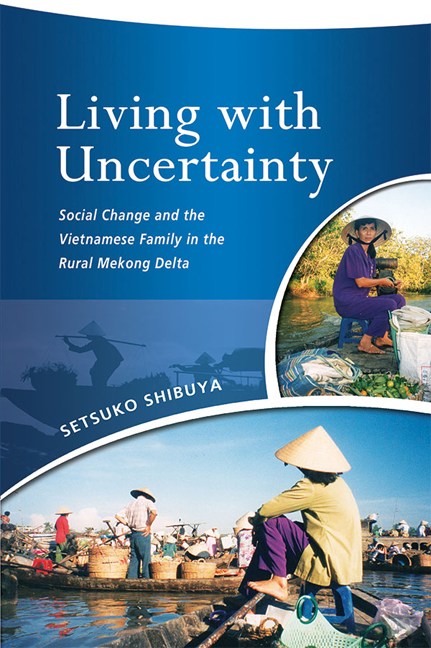Book contents
- Frontmatter
- Contents
- Acknowledgements
- 1 Introduction: Family and Society in Vietnam
- 2 On the Bank of the Mekong River
- 3 Family as the Social Unit
- 4 Farming Together
- 5 Working Outside of the Family
- 6 Education of Children and the Future
- 7 Feeling Poor
- 8 Social Change and the Family in the Rural Mekong Delta
- Bibliography
- Index
- About the Author
2 - On the Bank of the Mekong River
Published online by Cambridge University Press: 19 May 2017
- Frontmatter
- Contents
- Acknowledgements
- 1 Introduction: Family and Society in Vietnam
- 2 On the Bank of the Mekong River
- 3 Family as the Social Unit
- 4 Farming Together
- 5 Working Outside of the Family
- 6 Education of Children and the Future
- 7 Feeling Poor
- 8 Social Change and the Family in the Rural Mekong Delta
- Bibliography
- Index
- About the Author
Summary
CAN THO CITY
In order to understand the life of farmers in the rural Mekong Delta, it would be useful to have a broad picture of the area. The village of Long Tuyen, where the research was done lies close to the city of Can Tho, which lies in the heart of the Mekong Delta in southern Vietnam. The Mekong River splits into several branches in the Delta after flowing from the Tibetan uplands through the countries of mainland Southeast Asia, and the water provided by the river, its small branches and canals throughout the area, and the tropical climate characterized by alternating rainy and dry seasons make the land suitable for the production of many kinds of food resources. Rice is one of them, for which the Mekong Delta is particularly well known.
The Mekong Delta has more than four million hectares of natural land, rich with natural resources. The Delta is the “rice bowl” of Vietnam, providing grain not only to its inhabitants, but also to the whole country. With rice being the main agricultural product, the area also produces a variety of tropical fruit, sold in the regional markets as well as in large towns and cities throughout the country. The province of Can Tho had a population of over 1,900 thousand in 1997, and 70 per cent of them were engaged in agriculture (Chi Cuc Thong Ke Kinh Te Tinh Can Tho 1998) (Can Tho Province was split into two administrative units, Can Tho City and Hau Giang Province, in 2004). The population comprises mainly of the Kinh (ethnic Vietnamese), the Khmer and the Chinese, the first being the majority.
On the bank of the Hau Giang River lies the city of Can Tho. The city serves as the political, economic, and commercial centre of the whole Mekong Delta region. It also serves as the educational centre of the Delta. In 1966, Can Tho University was founded; its most significant contributions have been to the field of agriculture. The commercial nature of the town is easily apparent at the big central market, where virtually everything is bought and sold: meat, fish, vegetables, fruits, rice, spices and other food products; kitchenware, furniture, hardware, fabrics, clothes — both new and used — shoes, hats, jewellery, and many other items.
- Type
- Chapter
- Information
- Living with UncertaintySocial Change and the Vietnamese Family in the Rural Mekong Delta, pp. 22 - 51Publisher: ISEAS–Yusof Ishak InstitutePrint publication year: 2015



